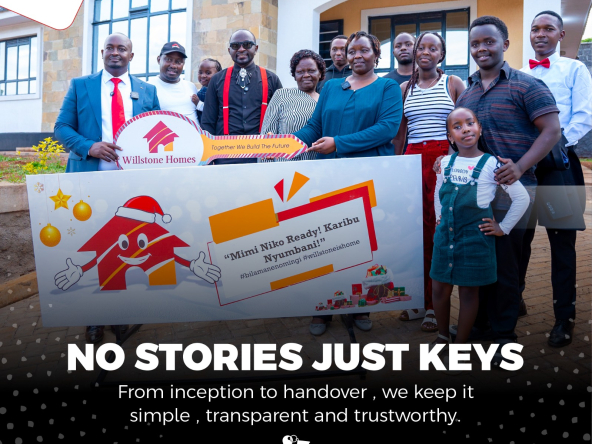In Nairobi’s competitive and often exclusionary real estate market, a quiet technological revolution is brewing — one that promises to lower the entry barrier for the average Kenyan. Real estate tokenization, a blockchain-driven process that allows people to invest in fractional shares of property, is emerging as a potential game-changer.
By digitizing ownership and enabling small-scale investment, tokenization could redefine property rights, financing models, and real estate liquidity in Kenya. While still in its infancy, this new model has the potential to democratize access to property assets in ways previously unthinkable.
What Is Real Estate Tokenization?
At its core, tokenization is the process of converting the value of a real-world asset — such as a parcel of land, a residential flat, or a commercial building — into digital tokens stored on a blockchain. These tokens represent fractional ownership, much like shares in a company.
For example, a KSh 100 million property could be divided into 1,000 tokens worth KSh 100,000 each. Investors can then buy and sell these tokens on digital marketplaces. Blockchain ensures that ownership is transparent, traceable, and nearly impossible to forge.
Unlike traditional real estate investment trusts (REITs), which are limited in Kenya due to regulatory hurdles and minimum investment thresholds, tokenized assets can accommodate much smaller contributions, enabling more widespread participation.
Read Also: Silent Estates: The Rise of Over-50s Retirement Communities in Kiambu and Limuru
Why Now? The Context Behind Tokenization in Kenya
Kenya’s real estate market has long faced a problem of inaccessibility. According to the Kenya Bankers Association (KBA), the average cost of a one-bedroom apartment in Nairobi in 2023 was between KSh 3.5 million and KSh 6 million, far out of reach for most citizens. Mortgages remain costly, with interest rates ranging between 12% and 16%, and fewer than 30,000 active mortgage accounts exist nationwide.
Meanwhile, the country’s mobile-first fintech ecosystem, famously led by platforms like M-PESA, has created a tech-savvy population comfortable with digital financial transactions. As blockchain awareness grows, especially in sectors like remittances and agriculture, real estate is emerging as the next frontier for disruption.
How It Works in Practice
In tokenized property systems, blockchain acts as the digital ledger. Smart contracts — self-executing agreements coded into the system — govern how tokens are issued, transferred, and managed. Each token is unique and verifiable.
Here’s a simplified example:
- A developer lists a commercial property on a blockchain platform.
- The total value is divided into 10,000 tokens.
- Investors purchase tokens using Kenyan Shillings or stablecoins (a type of cryptocurrency pegged to fiat).
- Investors can receive a share of rental income or sell their tokens on secondary marketplaces.
These platforms may integrate mobile money payments to allow seamless funding and withdrawal, potentially linking with MPESA or bank APIs.
Early Experiments and Kenya’s Blockchain Ecosystem
While no major tokenized real estate projects have launched at scale in Kenya as of 2024, pilot programs and interest are rising. Several startups in East Africa are exploring tokenization frameworks for property, including:
- Land LayBy, a proptech company with Kenyan roots that previously explored blockchain-based land title verification.
- Africa Blockchain Centre, which has publicly expressed interest in supporting tokenized real estate use cases.
- New fintechs offering fractional ownership in serviced apartments and co-working spaces using digital contracts and token mechanisms.
Though unregulated for now, Kenya’s Capital Markets Authority (CMA) has signaled interest in developing policy frameworks for virtual assets and security tokens. In its 2023 sandbox report, the CMA acknowledged that “tokenized investment vehicles could support micro-ownership and improve capital flow to real estate sectors.”
Potential Benefits for Kenya’s Real Estate Market
1. Democratized Access
Tokenization allows ordinary Kenyans to invest with as little as KSh 5,000–10,000. This is particularly impactful for younger professionals or those in the informal sector who are traditionally locked out of property investment.
2. Increased Liquidity
Unlike brick-and-mortar properties, tokenized assets can be traded in real-time. This adds liquidity to an otherwise illiquid market. Investors can exit or expand positions without the friction of traditional property sales.
3. Improved Transparency and Efficiency
Because all transactions and ownership records are recorded on a blockchain, disputes over titles, ownership claims, or valuation manipulation could drastically reduce.
4. Global Capital Access
Tokenized real estate enables diaspora investors to participate in the Kenyan property market without needing to be physically present. As blockchain networks are borderless, investment opportunities can attract global micro-investors.
Risks and Challenges
Despite its promise, tokenization is not without concerns:
1. Regulatory Uncertainty
Kenya has yet to establish a formal legal framework for real estate tokenization. Questions remain around taxation, securities classification, investor protection, and land registry integration.
As one Nairobi-based real estate lawyer noted, “Without legal recognition of blockchain-based deeds or shares, it’s difficult to know how enforceable your ownership really is.”
2. Fraud and Scams
The rise of crypto-related scams in Kenya (as reported by CBK and CAK) raises questions about consumer protection. Unscrupulous actors could exploit the tokenization trend without strong oversight.
3. Volatility and Market Immaturity
Kenya’s property market lacks consistent valuation standards. Tying token prices to poorly understood metrics could create volatility or speculative bubbles.
4. Digital Literacy Gaps
While Kenya’s digital adoption is high, understanding blockchain, wallet security, and smart contracts requires a steep learning curve for non-tech-savvy users. This may limit adoption to more urban and educated investors in the short term.
Read Also: Data Privacy in Nairobi Smart Apartments: A New Age of Security or Silent Intrusion?
What the Future Could Look Like
With the right regulatory support and infrastructure development, tokenization could:
- Enable developers to crowdfund new housing projects.
- Allow landlords to sell stakes in rental income.
- Facilitate diaspora remittance into real estate-backed tokens.
- Create secondary markets where tokens rise or fall based on location, demand, or yield.
Some experts believe that land registries themselves could eventually be moved to blockchain platforms to streamline due diligence and prevent fraud. This would align with Kenya’s broader e-government agenda and reduce the rampant issues of double allocation or forged land titles.
As one proptech entrepreneur in Westlands put it: “Tokenization won’t replace title deeds overnight, but it might make owning a slice of a mall or apartment complex as easy as buying shares on your phone.”
Unlocking a New Frontier
While still in its early days, real estate tokenization in Kenya represents a potentially transformative solution to long-standing issues of exclusion, liquidity, and opacity in the property sector. For Nairobi and its satellite towns, where land prices soar and homeownership dreams remain elusive for many, fractional ownership through blockchain could open doors that traditional finance has kept firmly shut.
Much work lies ahead — in law, infrastructure, education, and trust — but the seeds have been planted. If properly nurtured, tokenization could mark the beginning of a more inclusive, tech-forward property market for Kenya’s next generation of investors.





